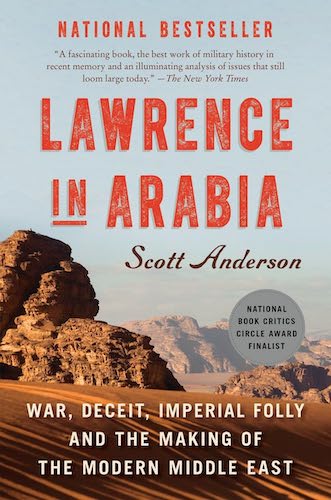Lawrence in Arabia
Book Author: Scott Anderson
Summary reviewed by:
Terrence Timmons
Terrence Timmons
Analyst
Bachelor of Arts (BA), University Of California, Santa Barbara 2019
With over 4 years of experience as an analyst. Terrence Timmons is committed to analyzing summaries without compromising on quality.
Lawrence in Arabia: Summary
Imagine a tale where the desert sands whisper secrets of empire and rebellion, where a single man's destiny becomes intertwined with the fate of nations.
This is the essence of "Lawrence in Arabia" by Scott Anderson, a riveting exploration of Thomas Edward Lawrence's enigmatic role in shaping the modern Middle East during the tumultuous years of World War I.
Anderson doesn't just recount history; he thrusts us into the heart of the desert storms, where diplomacy dances with deceit, and where Lawrence, an enigmatic British archaeologist-turned-spy, navigates the shifting sands of alliances and betrayals. Through meticulous research and captivating storytelling, Anderson reveals how Lawrence's unique understanding of the Arab world and his sympathies towards the Arab cause against the Ottoman Empire, coupled with his guerrilla warfare tactics, not only altered the course of the war but also the geopolitical landscape of the Middle East.
The book meticulously dissects the complexities of colonial ambitions, the betrayal of promises made to the Arabs, and the drawn lines that would later lead to decades of conflict. It's a narrative that challenges the myth of "Lawrence of Arabia," presenting a man far more complex and involved in the machinations of war and politics than previously portrayed. Anderson's work is a masterclass in historical narrative, painting a picture of a world where personal ambition and the destiny of nations are inseparably linked.
Lawrence in Arabia: Genres
Non-Fiction
History
Biography
Military History
Political Science
Lawrence in Arabia: Main Characters
Thomas Edward Lawrence (T.E. Lawrence): A British archaeologist, military officer, and diplomat who played a significant role in the Arab Revolt against the Ottoman Empire. Values: Strategic brilliance and empathy towards the Arab cause. Lawrence’s strategic guile is evident in his orchestration of the Arab Revolt, leveraging his deep understanding of Arab culture and politics.
Prince Faisal bin Hussein bin Ali al-Hashimi: A leader of the Arab Revolt and key ally of Lawrence. Values: Leadership and vision for an independent Arab state. Faisal’s political acumen and vision for Arab independence are central to his collaboration with Lawrence and the broader goals of the revolt.
Otto Liman von Sanders: A German general advising the Ottoman Empire. Values: Military discipline and strategic rigor. His efforts to counter the Arab Revolt and British influence showcase his military expertise and commitment to the Ottoman cause.
Aaron Aaronsohn: A Jewish agronomist and Zionist, running a spy network for the British. Values: Zionism and scientific innovation. His dedication to the Zionist cause and innovative espionage techniques highlight the diverse interests vying for influence in the region.
Lawrence in Arabia: Themes
Imperialism and Nationalism: The conflicting interests of the British, French, Ottoman, and Arab nationalist movements illustrate the complex dynamics of imperialism and the rise of nationalism. Lawrence’s efforts to navigate these interests underscore the challenges of achieving personal and national ambitions.
Betrayal and Deception: The broken promises made to the Arab leaders by the British, exemplified by the Sykes-Picot Agreement, highlight themes of betrayal and the deceptive nature of wartime diplomacy.
Identity and Legacy: Lawrence’s struggle with his identity and the legacy of his actions in Arabia reflect broader questions about the impact of individuals on history and the construction of historical myths.
Cultural Understanding and Misunderstanding: Lawrence’s unique ability to bridge cultural divides versus the general misunderstandings and stereotypes held by many Westerners about the Arab world showcase the importance and challenges of cross-cultural understanding in international affairs.
Lawrence in Arabia: Methodology
In sculpting this summary, our approach was guided by a blend of expert analysis, synthesizing content, and unwavering commitment to quality and integrity. Our diverse team delved deeply into "Lawrence in Arabia," extracting pivotal themes such as imperialism and the intricacies of identity, which resonate with both historical events and contemporary discussions. By distilling the essence of Scott Anderson's narrative, we aimed to present a clear, engaging overview that remains true to the original text's depth and nuance. Our rigorous review process ensures that every word reflects the book’s core insights, offering a trustworthy and enlightening glimpse into Lawrence's complex world.


Lawrence in Arabia
Date Published: August 6, 2013
Disclaimer: As an Amazon Associate I earn from qualifying purchases.




